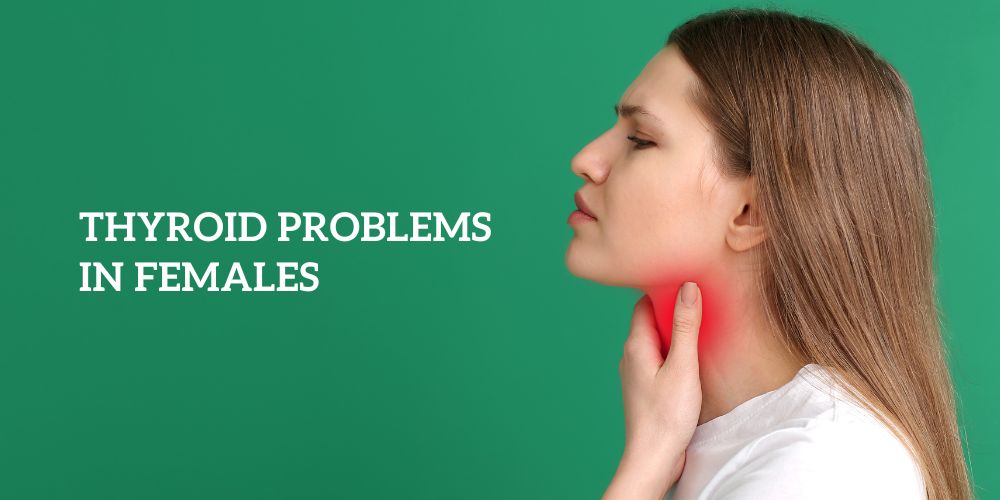The thyroid, a small butterfly-shaped gland in your neck, plays a crucial role in regulating various bodily functions. For females, maintaining a healthy thyroid is essential for overall well-being. However, thyroid problems can arise, causing a range of symptoms that may impact daily life. In this article, we will explore the common signs and symptoms of thyroid problems in females and shed light on what causes these issues.
1. What Causes Thyroid Problems in Females?
Before delving into the symptoms, it’s important to understand what can lead to thyroid problems in females. One of the primary causes is an imbalance in the production of thyroid hormones – T3 (triiodothyronine) and T4 (thyroxine). This imbalance can occur due to various factors, including:
- Autoimmune Disorders: Conditions like Hashimoto’s thyroiditis and Graves’ disease can cause the immune system to attack the thyroid, disrupting its normal function.
- Iodine Deficiency: The thyroid needs iodine to produce hormones. Insufficient iodine in the diet can lead to thyroid dysfunction.
- Genetic Factors: A family history of thyroid disorders can increase the risk for females.
- Pregnancy and Menopause: Hormonal changes during pregnancy and menopause may impact thyroid function.
2. Recognizing the Symptoms of Thyroid Problems in Older Females:
2.1 Hair Fall: Hair loss, particularly noticeable thinning on the scalp, can be a symptom of thyroid problems in females. The thyroid hormones play a crucial role in hair growth and maintenance. When there’s an imbalance, hair follicles may become more sensitive to normal levels of hormones, leading to increased hair shedding.
2.2 Irregular Periods: Thyroid issues can affect the menstrual cycle. Irregular periods, heavy or light flow, and even missed periods are common signs. The thyroid hormones influence the ovaries, and any disruption in their levels can impact the normal hormonal regulation of the menstrual cycle.
2.3 Weight Gain/Loss: Changes in weight, often unexplained, can be linked to thyroid problems. Hypothyroidism, characterized by an underactive thyroid, may lead to weight gain, while hyperthyroidism, an overactive thyroid, can result in weight loss. These changes are often accompanied by other symptoms like fatigue and changes in appetite.
2.4 Fatigue: Feeling tired despite getting enough sleep is a prevalent symptom of thyroid issues. Both hypothyroidism and hyperthyroidism can cause fatigue, affecting daily activities and overall quality of life. If fatigue persists, it’s essential to explore the possibility of an underlying thyroid problem.
3. Signs of Thyroid Problems in Women:
3.1 Changes in Skin and Nails: Thyroid dysfunction can manifest in changes to the skin and nails. Dry skin, brittle nails, and even the development of yellowed skin can be indicative of thyroid problems. The thyroid hormones play a role in skin regeneration and maintenance.
3.2 Temperature Sensitivity: An intolerance to cold or heat can be a symptom of thyroid issues. Hypothyroidism may make individuals more sensitive to cold temperatures, while hyperthyroidism can cause an increased sensitivity to heat. Paying attention to how your body responds to temperature changes can provide valuable clues.
3.3 Muscle Weakness and Joint Pain: Thyroid problems can lead to muscle weakness and joint pain. Individuals may experience aches and pains, especially in the muscles and joints. This can impact mobility and daily activities, and if persistent, it’s crucial to consult a healthcare professional.
4. Early Symptoms of Thyroid Problems in Females:
Early detection of thyroid issues is key to managing the condition effectively. Recognizing the following early symptoms can prompt timely intervention:
4.1 Mood Changes: Thyroid imbalances can affect mood, leading to symptoms such as irritability, anxiety, and even depression. If you notice unexplained changes in your emotional well-being, it’s essential to consider the possibility of thyroid involvement.
4.2 Changes in Bowel Habits: Both constipation and diarrhea can be early indicators of thyroid dysfunction. The thyroid hormones influence the digestive system, and any disruption can lead to changes in bowel habits.
4.3 Menstrual Irregularities: Irregularities in the menstrual cycle, such as changes in flow or skipped periods, can be early signs of thyroid problems. Monitoring your menstrual cycle and seeking medical advice for irregularities is crucial.
5. Conclusion: Seeking Help for Thyroid Issues in Females
In conclusion, understanding the symptoms of thyroid problems in females is crucial for early detection and effective management. If you or someone you know is experiencing any of these symptoms, it’s essential to consult a healthcare professional for a thorough evaluation. A timely diagnosis and appropriate treatment can help manage thyroid issues and improve overall well-being. Remember, taking charge of your health begins with awareness and proactive healthcare decisions.




